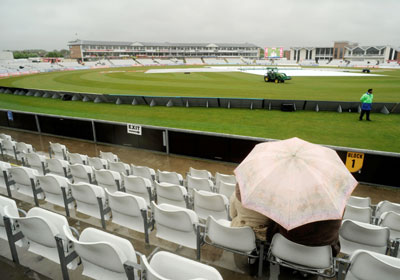
Weather forecast: Rain threatens to disrupt match.
A sure shot dampener even before the fixture, which you were waiting for in eager anticipation, is actually played.
Curse the heavens, blame Mother Nature, hurl abuses on the divine forces and do whatever comes to your mind, but that essentially means you have resigned to the eventuality that rain is going to play spoilsport and foil your plans.
This is the case when you are aware of the forecasts. But there are occasions when the rain gods attack Planet Earth without prior warning.
In the latter case, the disappointment is manifold and frustrations palpable.
However, there are a few instances when one actually tends to enjoy sport when it pours, particularly if the sport happens to be football.
But whether it provides enjoyment or not, rains do have a tendency of ensuring results which are way beyond expectations.
As the monsoon finally appears to be showering its blessings on parts of India, rediff.com takes a looks at some sporting instances where rain played spoilsport, leaving most frustrated and a few happy in the bargain.
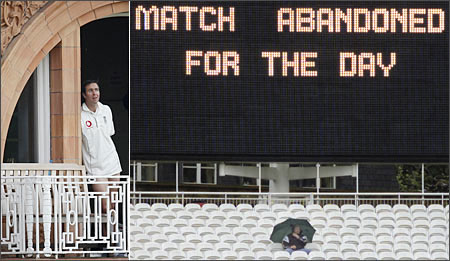
But England was definitely robbed of certain victory that fateful July day at Lord's in 2007.
India were nine wickets down, with M S Dhoni and S Sreesanth at the crease, chasing an impossible 380 to win, when rain rushed to their rescue.
For about three hours, the rain and deteriorating light helped the visitors in the final session of play.
Tea was taken early, but rain never allowed the game to resume. India ended the Test at 282 for nine, Dhoni unbeaten on 76.
The weather helped the Indians avoid a eleventh defeat in 15 matches at Lord's.
India won the subsequent Test at Trent Bridge and pocketed the series.
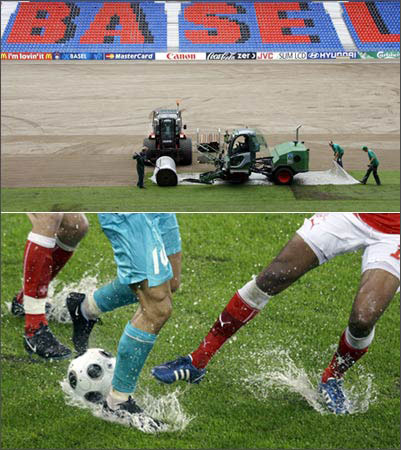
Spain won its first major title in 44 years.
UEFA ensured the competition was conducted in exemplary fashion.
However, it could not control the weather and the number of matches that were played in heavy rain, with thunder and lightning adding a dramatic backdrop.
The Swiss city of Basel is where most of the rain fell during the tournament.
The Group A match between co-hosts Switzerland and Turkey looked like it might have to be abandoned at one stage because of the conditions.
The skies over Basel also provided a torrential storm during the Germany-Turkey semi-final.
The continuous downpour affected television feeds, depriving millions of fans of the dramatic closing stages of the match, which Germany won 3-2.
A new turf had to be installed at St Jakob Park in Basel because the old turf was damaged by incessant rain.
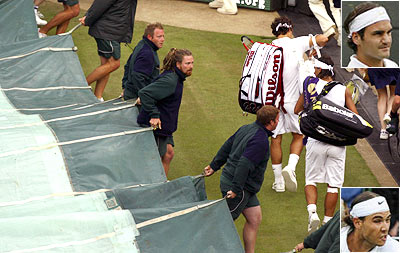
Rafael Nadal was the favourite, having thrashed Roger Federer in the Roland Garros final.
It wasn't surprising when he made the better start with a break in game three, saving three break points on his way to the first set.
The momentum shifted at the start of the second set as Federer raced to a 4-1 lead, but Nadal came roaring back with five straight games for a two-set lead.
With Federer leading 5-4 after two hours and 14 minutes, the heavens opened again.
And when play resumed following a 80 minute break, it was advantage Federer.
The Swiss ace took the third and the fourth sets, both in tie-breaks.
At 2-2 in the decider, the rain came back and it seemed unlikely that any further play would be possible that evening.
However, the shower passed after 30 minutes and it was Nadal who came back strong after this rain break, winning the championship 9-7 in the fifth.
The Spaniard missed two championship points in the fourth set, but recovered well to win a dramatic match, arguably the best in Wimbledon history.
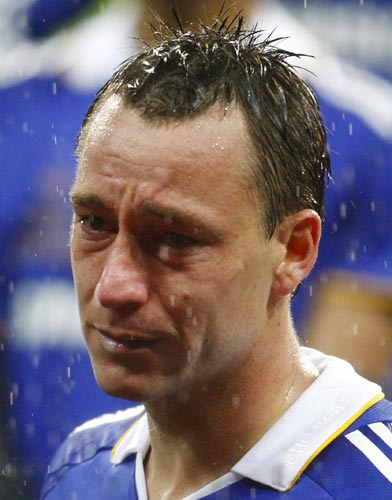
Intermittent rain, the met department announced.
The fans were not to be deterred though, arriving in their thousands.
The rain hammered down and soon the pitch at the Luzhniki stadium resembled a pool full of green algae.
The English teams were on an even footing after regulation and extra-time and a penalty shoot-out followed.
Rio Ferdinand won the toss; United went first in the shootout.
Tevez scored, Ballack replied. Carrick put Man U ahead, Belletti equalised.
Cristiano Ronaldo's kick was saved by Petr Cech.
All the attempts thereafter went in and it was up to captain John Terry to win the cup for Chelsea.
Terry lost his footing when planting his standing foot by the ball and even though Man U custodian Edwin van der Sar was sent the wrong way, Terry hit the outside of the right post.
Van der Sar then pulled off the crucial save for United off Nicolas Anelka to ensure the trophy travelled to Manchester.
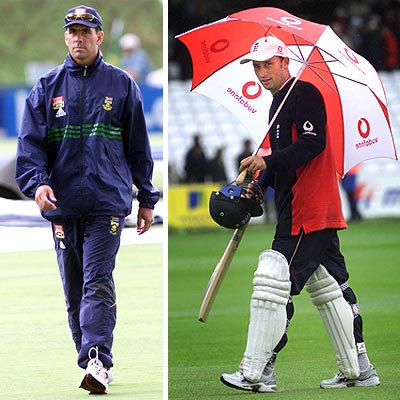
The only instance in Test cricket where one innings was forfeited.
South Africa, having already won the series 2-0, made 155 for 6 on the first day.
And then came the rain, washing out the next three days.
With only a day left, the match was set for a dull draw. But that was until Hansie Cronje, the South African captain, convinced his English counterpart, Nasser Hussain, that the hosts would continue batting till they reached about 250 and then declare.
The teams would then both forfeit an innings, leaving England a target (eventually 249) to win.
At that time, the laws of cricket only permitted a side to forfeit its second innings, so England's first innings was treated as having been declared without any runs scored.
The visitors went on to score 251 and won by two wickets.
Cronje was heavily criticised for his decision. Later, it was discovered that he had struck a deal with a bookie to ensure the game ended with a positive result.
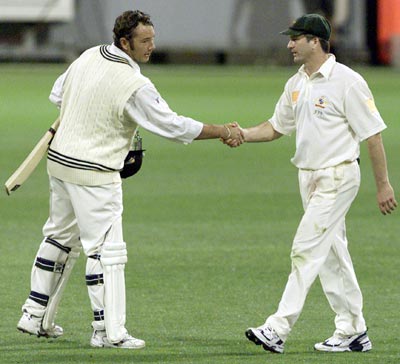
The Australian captain made a sporting declaration in the first Test against New Zealand at Brisbane in 2001.
It almost cost Australia the match.
Australia amassed 486 for nine in their first innings before the rains came.
There seemed little hope of a result after heavy rain disrupted three days, but Kiwi skipper Stephen Fleming set up the prospect of a close finish when he declared his first innings at 287 for eight, avoiding the follow-on.
The hosts, with a 199 runs first innings lead, then responded with 84 for two off 14 overs before Waugh made his declaration less than an hour after lunch to give both teams a chance of winning on the last day.
The Kiwis, chasing 284 for a win, finished on 274 for six as they ran out of time.
Waugh's gamble was criticised by many. The resolute Aussie maintained his side wouldn't have lost and that he was not going to change his attacking tactics either.
'We played some pretty good cricket,' Waugh summed up the tie later. 'Realistically, if it didn't rain, we would have won the game.'
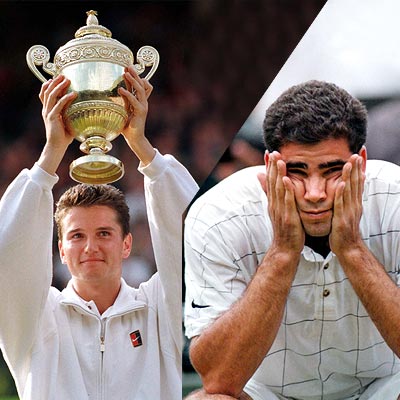
It was Richard Krajicek's year at Wimbledon.
And neither a reputed opponent (Sampras) nor inclement weather (incessant rain) could stop the Dutchman from cementing his place among the league of extraordinary gentlemen that Wimbledon champions are.
Coming into Wimbledon in 1996, Krajicek had never progressed beyond the fourth round at the All England Club, and had lost in the first round the two previous years.
The American was the clear favourite, having won the title the past three years.
Krajicek beat 1991 champion Michael Stich in the fourth round to set up a last eight meeting with Sampras.
The match had three rain delays, the third one being the most significant.
With Krajicek up two-sets-to-none (7-5, 7-6, 1-1), the match was rained out for the day.
Many felt that was enough for the American to recover and continue his pursuit to equal the legendary Bjorn Borg's record of five consecutive championships.
The rain had given Sampras a lifeline, they said.
However, the Dutchman surprised the pundits, his backhand pass broke Sampras for a 4-3 edge in the third set after resumption, making the result a foregone conclusion.
Krajicek smashed 29 aces to Sampras's eight and thoroughly dominated the American.
Sampras's hopes were thus washed away.
The defeat remains Sampras's only singles defeat at Wimbledon in an eight-year period between 1993 and 2000.
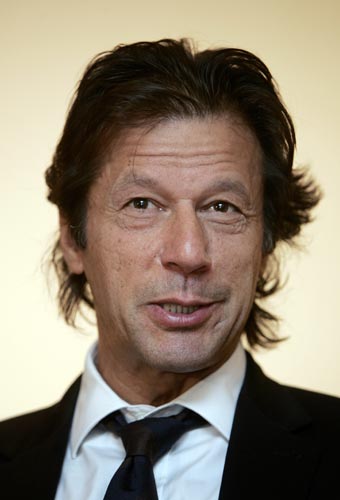
England, having dismissed Pakistan for a paltry 74 in a 1992 World Cup game, was forced to share points with Imran Khan's team after incessant rain caused the match to be abandoned.
Pakistan, who would have been eliminated from the tournament had they lost that game, benefited from the point gained and went all the way to the final.
Where they won the World Cup against England.
Without the rain, Imran Khan would never have savoured his last great triumph.
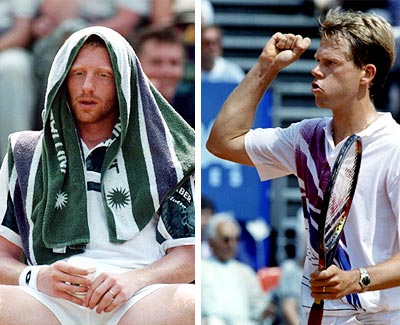
And it was a match that took two days to complete due to rain.
The Swede, who had come back from two sets down against Miloslav Mecir in the semi-final, was definitely the underdog going into the final, having lost most of his previous matches against the German.
But he had a good start, racing to a 3-0 lead before Becker got a break back.
With Edberg up 3-2, the match faced its first rain delay, one that ensured the tie only resumed the next day.
The break worked wonders for Becker and he came back strong to pocket the opening set 6-4, reeling off three straight games.
Then the rain came down again.
When play resumed a day later, the Swede had regained his composure, played a good tie-break in the second, ensured an early break in the third and forced Becker to submission in the fourth.
As the rain played hide and seek, so did Becker's mood. He got increasingly frustrated with his inability to return Edberg's kick-serve and only made things easier for his opponent.
The result, a first All England title for the Swede.